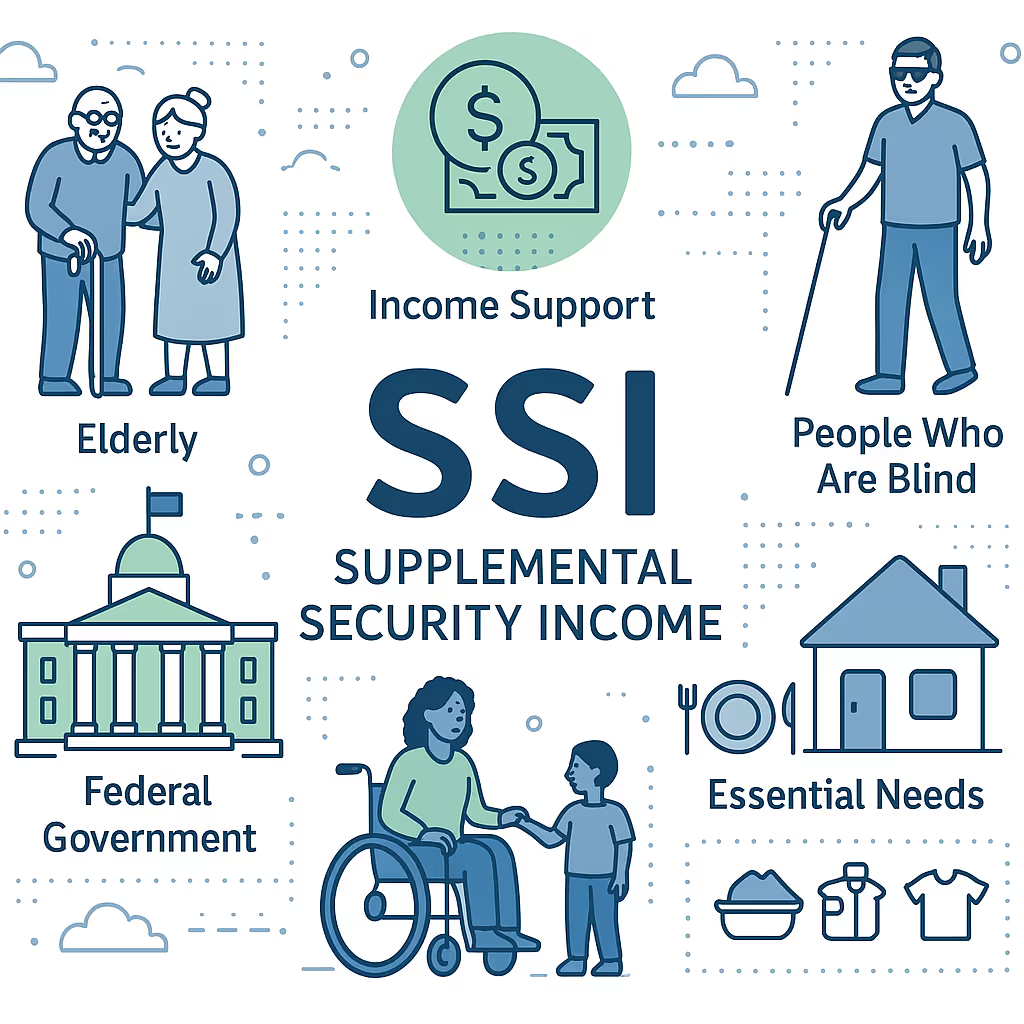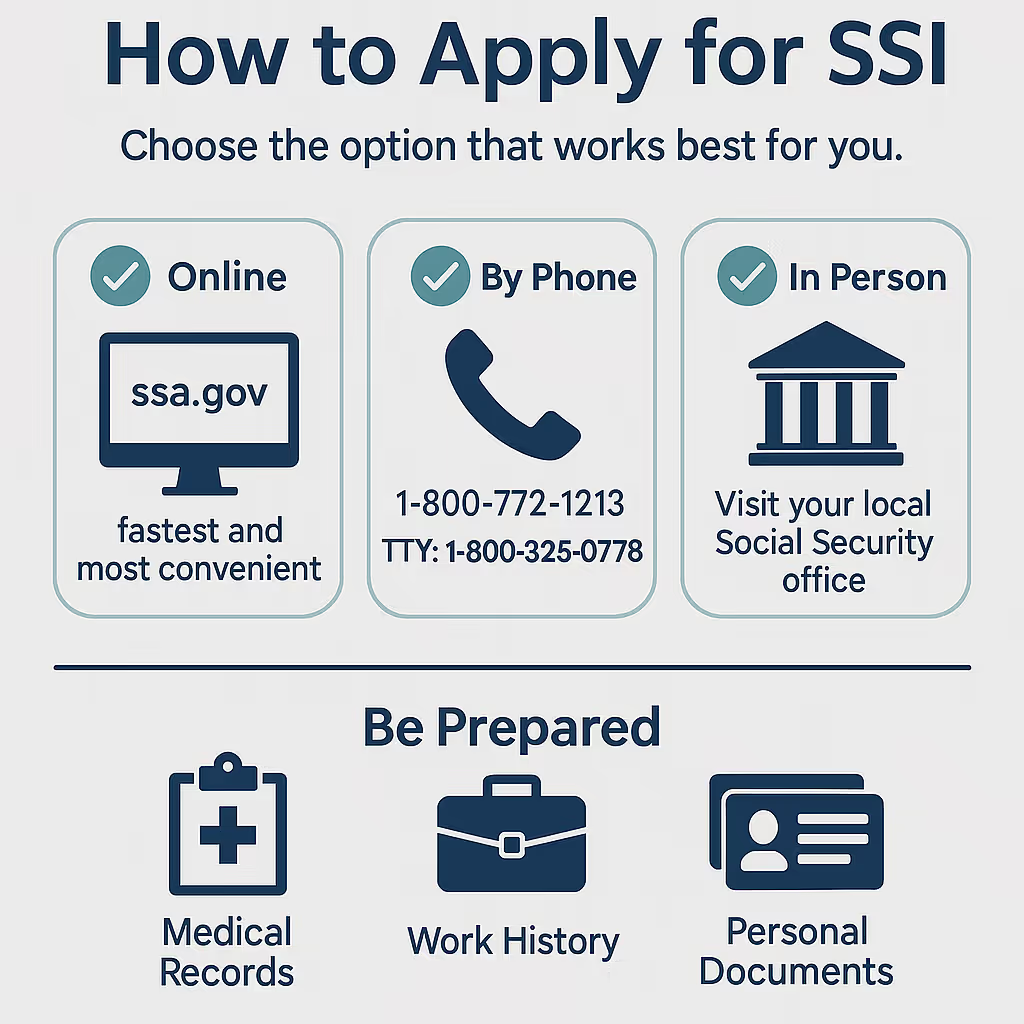Supplemental Security Income (SSI)
Supplemental Security Income (SSI) provides monthly payments to people with limited income and resources. This landing page gives you quick guides, tools, and resources to understand the program, apply successfully, and manage your benefits.

What is SSI?
Supplemental Security Income (SSI) is a federal program run by the Social Security Administration. It provides income support for older adults, people who are blind, or disabled individuals with limited income and resources. Unlike Social Security Disability Insurance (SSDI), SSI benefits are funded by general tax revenues, not work history. Payments help cover essential needs like food, shelter, and clothing for eligible individuals.


How to Apply
The SSI application process is simple, but you must provide complete information about your finances, disability, and living arrangements. You can:
Apply Online: Use SSA’s website for certain disability benefits applications.
By Phone: Call 1-800-772-1213 (TTY: 1-800-325-0778).
In Person: Visit your local Social Security office.
Start early—SSI benefits cannot be paid for months before you file.
Eligibility Rules
To qualify for Supplemental Security Income (SSI), you must meet strict eligibility requirements:
Age/Disability: 65+, blind, or disabled and unable to work jobs
Financial: Resources under $2,000 (individual) / $3,000 (couple)
Residency: Be a U.S. citizen or qualified alien living in the U.S.
Applicants must also apply for other programs for which they may be eligible.


SSI vs. SSDI
SSI and Social Security Disability Insurance (SSDI) are two programs with similar goals but different qualifications. SSI is based on financial need and disability, while SSDI benefits depend on your work history and payroll contributions. Both programs are managed by the Social Security Administration. If denied, applicants often appeal, and expert guidance can help improve approval chances.
SSI for Children
Children may be eligible for SSI if they meet disability and income requirements. The Social Security Administration reviews whether the child’s condition severely limits daily functioning. Parents’ income and resources may count (“deeming”), but exceptions apply. Approved SSI benefits often include Medicaid. This program ensures children from low-income households receive medical care, money for basic needs, and long-term income support when needed.


State Supplements
Some states add extra payments to SSI benefits. These State Supplemental Payments (SSPs) vary based on location, living arrangement, and personal factors. For example, California and New York offer state-managed supplements, while other states rely on SSA to administer them. To learn more, check with your local Social Security office, since rules, amounts, and programs can change each year.
SSA-Administered: California, Hawaii, New Jersey
State-Managed: New York, Massachusetts, Oregon
No Child Supplements: Alabama, Texas, Virginia
Disability Timeline Calculator
The Social Security Administration reviews disability applications carefully. Most SSI cases take six to eight months to make an initial decision. The review process includes medical file checks, eligibility steps, and verification of income. Some conditions qualify for faster approval through the Compassionate Allowances program. Use our calculator tool to estimate how long your SSI disability benefits application may take before you receive a payment decision.


Application Checklist
Prepare these documents before applying for SSI to make the process smoother:
Identity proof (Social Security card, birth certificate, citizenship or immigration papers)
Financial records (bank statements, property deeds, life insurance, tax returns)
Medical documentation (doctor records, prescription lists, hospital reports)
Work history (jobs held in the past 15 years, pay rates, duties)
Living arrangement proof (lease, rent receipts, utility bills)
Frequently Asked Questions about SSI
Supplemental Security Income (SSI) is needs-based and designed for people with little income or resources, while Social Security Disability Insurance (SSDI) depends on your work history and Social Security taxes paid. Both disability benefits are administered by the Social Security Administration. SSI provides income support for those who may be eligible without work credits, while SSDI benefits serve disabled workers and their families.
An eligible individual can receive up to $967 per month, while an eligible couple may receive up to $1,450. Some states provide additional supplemental security payments. Payments may change annually due to COLA (cost-of-living adjustments). To find updated information, visit SSA.gov or check SSA publications. Your local Social Security office can also confirm current SSI benefit rates and eligibility rules.
The SSI application process usually takes six to eight months for an initial review. The Social Security Administration uses a five-step evaluation to determine eligibility, including medical evidence and a financial review. If denied, applicants can appeal. Severe conditions may be approved faster under Compassionate Allowances. Starting early and providing complete documentation can help reduce delays and speed up the decision timeline.
Yes, children may be eligible for SSI if they are blind or disabled and meet financial requirements. The Social Security Administration evaluates whether the child’s medical condition causes marked functional limitations. Parents’ income may be considered, though exceptions exist. Once approved, children often receive Medicaid automatically. SSI benefits provide money to support essential needs like food, education, and healthcare for younger applicants.
If your SSI claim is denied, you may appeal through reconsideration, a hearing, or further legal review. Many people are denied at first, but persistence matters. Gathering stronger medical evidence, clarifying income information, and seeking expert help can improve your chances. The Social Security Administration encourages applicants to use appeals rather than re-filing. Always file your appeal within the SSA’s deadlines to remain eligible.
You must provide original documents or certified copies. These include your Social Security card, birth certificate, proof of citizenship or immigration status, financial records (bank accounts, property deeds), and medical documentation. Work history from the past 15 years is also needed. If you’re missing something, the SSA can help. It’s best to start your application process early to avoid month-long delays.
If your SSI claim is denied, you may appeal through reconsideration, a hearing, or further legal review. Many people are denied at first, but persistence matters. Gathering stronger medical evidence, clarifying income information, and seeking expert help can improve your chances. The Social Security Administration encourages applicants to use appeals rather than re-filing. Always file your appeal within the SSA’s deadlines to remain eligible.
Are You Eligible for SSI Benefits?
Every month you wait could mean missing out on essential income support. The application process takes time, so the sooner you begin,
the sooner you may receive SSI benefits. Find out today if you qualify and take the next step toward financial security.
